University Human Health Reflection: Weeks 1-3 Lecture Analysis
VerifiedAdded on 2022/08/21
|5
|1091
|12
Journal and Reflective Writing
AI Summary
This assignment is a student's reflective journal entries from a public health course, covering three weeks of lectures. Week 1 focuses on non-communicable diseases (NCDs) such as cardiovascular disease, highlighting risk factors like obesity and hypertension, and the importance of prevention. Week 2 explores evolutionary perspectives on the Developmental Origins of Health and Disease (DoHAD), emphasizing developmental plasticity and the impact of environmental factors. Week 3 delves into the fetal origin hypothesis, discussing the influence of the gestational period on health outcomes and the benefits of breast milk. The reflections demonstrate an understanding of key concepts and their relevance to broader community health issues, including discussions of the Barker hypothesis and the thrifty phenotype hypothesis. The assignment also references key research papers to support the student's understanding.
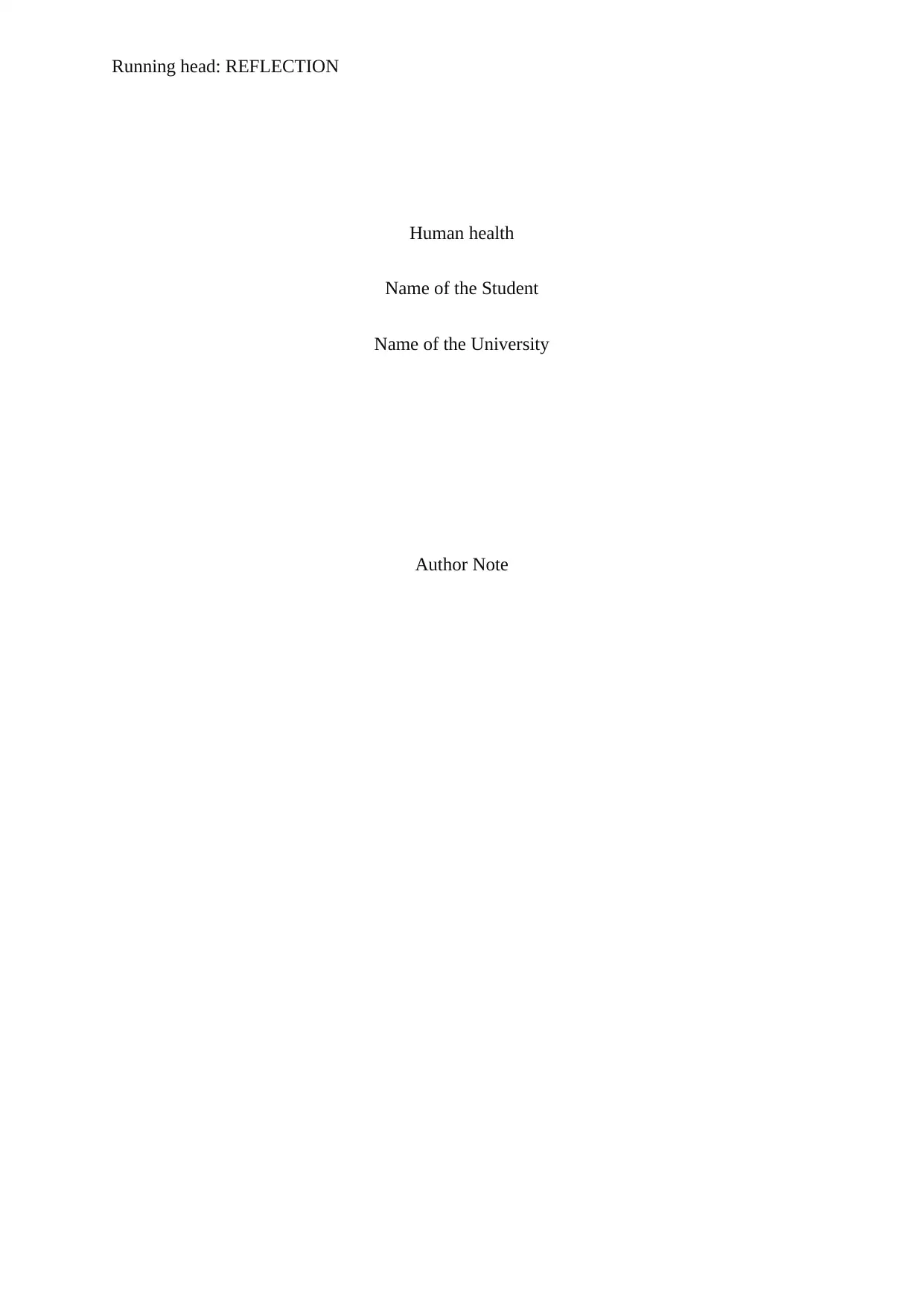
Running head: REFLECTION
Human health
Name of the Student
Name of the University
Author Note
Human health
Name of the Student
Name of the University
Author Note
Paraphrase This Document
Need a fresh take? Get an instant paraphrase of this document with our AI Paraphraser
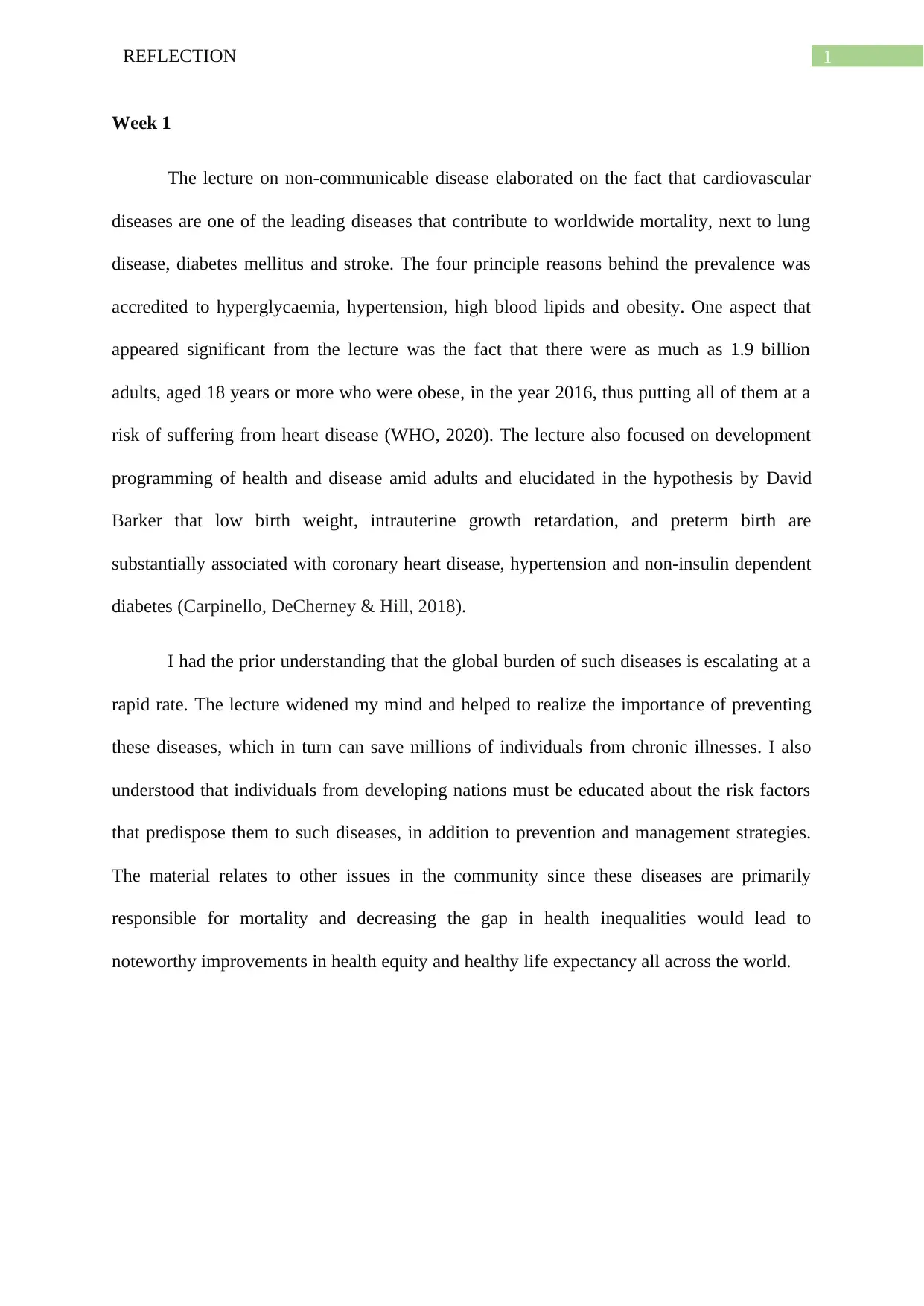
1REFLECTION
Week 1
The lecture on non-communicable disease elaborated on the fact that cardiovascular
diseases are one of the leading diseases that contribute to worldwide mortality, next to lung
disease, diabetes mellitus and stroke. The four principle reasons behind the prevalence was
accredited to hyperglycaemia, hypertension, high blood lipids and obesity. One aspect that
appeared significant from the lecture was the fact that there were as much as 1.9 billion
adults, aged 18 years or more who were obese, in the year 2016, thus putting all of them at a
risk of suffering from heart disease (WHO, 2020). The lecture also focused on development
programming of health and disease amid adults and elucidated in the hypothesis by David
Barker that low birth weight, intrauterine growth retardation, and preterm birth are
substantially associated with coronary heart disease, hypertension and non-insulin dependent
diabetes (Carpinello, DeCherney & Hill, 2018).
I had the prior understanding that the global burden of such diseases is escalating at a
rapid rate. The lecture widened my mind and helped to realize the importance of preventing
these diseases, which in turn can save millions of individuals from chronic illnesses. I also
understood that individuals from developing nations must be educated about the risk factors
that predispose them to such diseases, in addition to prevention and management strategies.
The material relates to other issues in the community since these diseases are primarily
responsible for mortality and decreasing the gap in health inequalities would lead to
noteworthy improvements in health equity and healthy life expectancy all across the world.
Week 1
The lecture on non-communicable disease elaborated on the fact that cardiovascular
diseases are one of the leading diseases that contribute to worldwide mortality, next to lung
disease, diabetes mellitus and stroke. The four principle reasons behind the prevalence was
accredited to hyperglycaemia, hypertension, high blood lipids and obesity. One aspect that
appeared significant from the lecture was the fact that there were as much as 1.9 billion
adults, aged 18 years or more who were obese, in the year 2016, thus putting all of them at a
risk of suffering from heart disease (WHO, 2020). The lecture also focused on development
programming of health and disease amid adults and elucidated in the hypothesis by David
Barker that low birth weight, intrauterine growth retardation, and preterm birth are
substantially associated with coronary heart disease, hypertension and non-insulin dependent
diabetes (Carpinello, DeCherney & Hill, 2018).
I had the prior understanding that the global burden of such diseases is escalating at a
rapid rate. The lecture widened my mind and helped to realize the importance of preventing
these diseases, which in turn can save millions of individuals from chronic illnesses. I also
understood that individuals from developing nations must be educated about the risk factors
that predispose them to such diseases, in addition to prevention and management strategies.
The material relates to other issues in the community since these diseases are primarily
responsible for mortality and decreasing the gap in health inequalities would lead to
noteworthy improvements in health equity and healthy life expectancy all across the world.
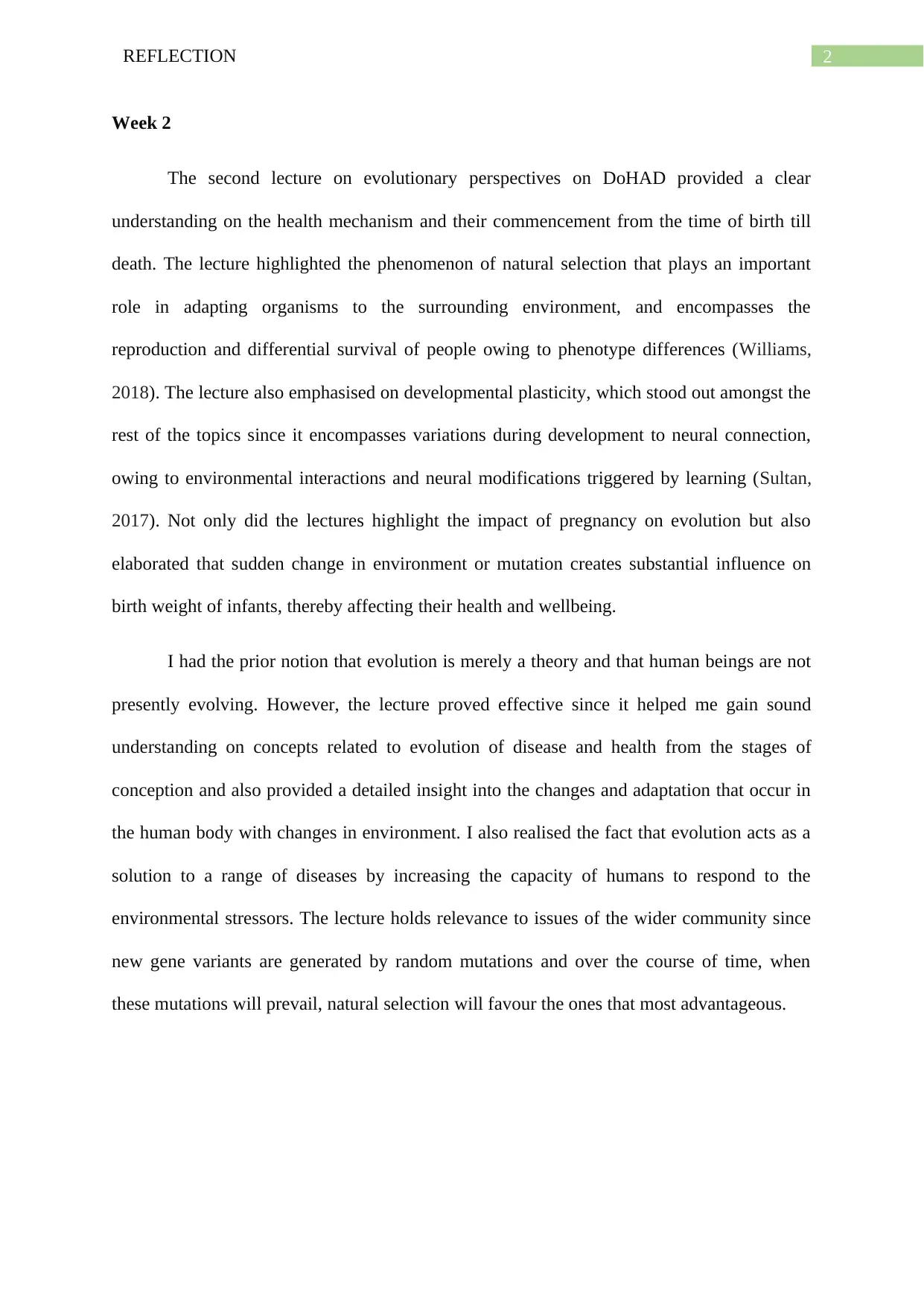
2REFLECTION
Week 2
The second lecture on evolutionary perspectives on DoHAD provided a clear
understanding on the health mechanism and their commencement from the time of birth till
death. The lecture highlighted the phenomenon of natural selection that plays an important
role in adapting organisms to the surrounding environment, and encompasses the
reproduction and differential survival of people owing to phenotype differences (Williams,
2018). The lecture also emphasised on developmental plasticity, which stood out amongst the
rest of the topics since it encompasses variations during development to neural connection,
owing to environmental interactions and neural modifications triggered by learning (Sultan,
2017). Not only did the lectures highlight the impact of pregnancy on evolution but also
elaborated that sudden change in environment or mutation creates substantial influence on
birth weight of infants, thereby affecting their health and wellbeing.
I had the prior notion that evolution is merely a theory and that human beings are not
presently evolving. However, the lecture proved effective since it helped me gain sound
understanding on concepts related to evolution of disease and health from the stages of
conception and also provided a detailed insight into the changes and adaptation that occur in
the human body with changes in environment. I also realised the fact that evolution acts as a
solution to a range of diseases by increasing the capacity of humans to respond to the
environmental stressors. The lecture holds relevance to issues of the wider community since
new gene variants are generated by random mutations and over the course of time, when
these mutations will prevail, natural selection will favour the ones that most advantageous.
Week 2
The second lecture on evolutionary perspectives on DoHAD provided a clear
understanding on the health mechanism and their commencement from the time of birth till
death. The lecture highlighted the phenomenon of natural selection that plays an important
role in adapting organisms to the surrounding environment, and encompasses the
reproduction and differential survival of people owing to phenotype differences (Williams,
2018). The lecture also emphasised on developmental plasticity, which stood out amongst the
rest of the topics since it encompasses variations during development to neural connection,
owing to environmental interactions and neural modifications triggered by learning (Sultan,
2017). Not only did the lectures highlight the impact of pregnancy on evolution but also
elaborated that sudden change in environment or mutation creates substantial influence on
birth weight of infants, thereby affecting their health and wellbeing.
I had the prior notion that evolution is merely a theory and that human beings are not
presently evolving. However, the lecture proved effective since it helped me gain sound
understanding on concepts related to evolution of disease and health from the stages of
conception and also provided a detailed insight into the changes and adaptation that occur in
the human body with changes in environment. I also realised the fact that evolution acts as a
solution to a range of diseases by increasing the capacity of humans to respond to the
environmental stressors. The lecture holds relevance to issues of the wider community since
new gene variants are generated by random mutations and over the course of time, when
these mutations will prevail, natural selection will favour the ones that most advantageous.
⊘ This is a preview!⊘
Do you want full access?
Subscribe today to unlock all pages.

Trusted by 1+ million students worldwide
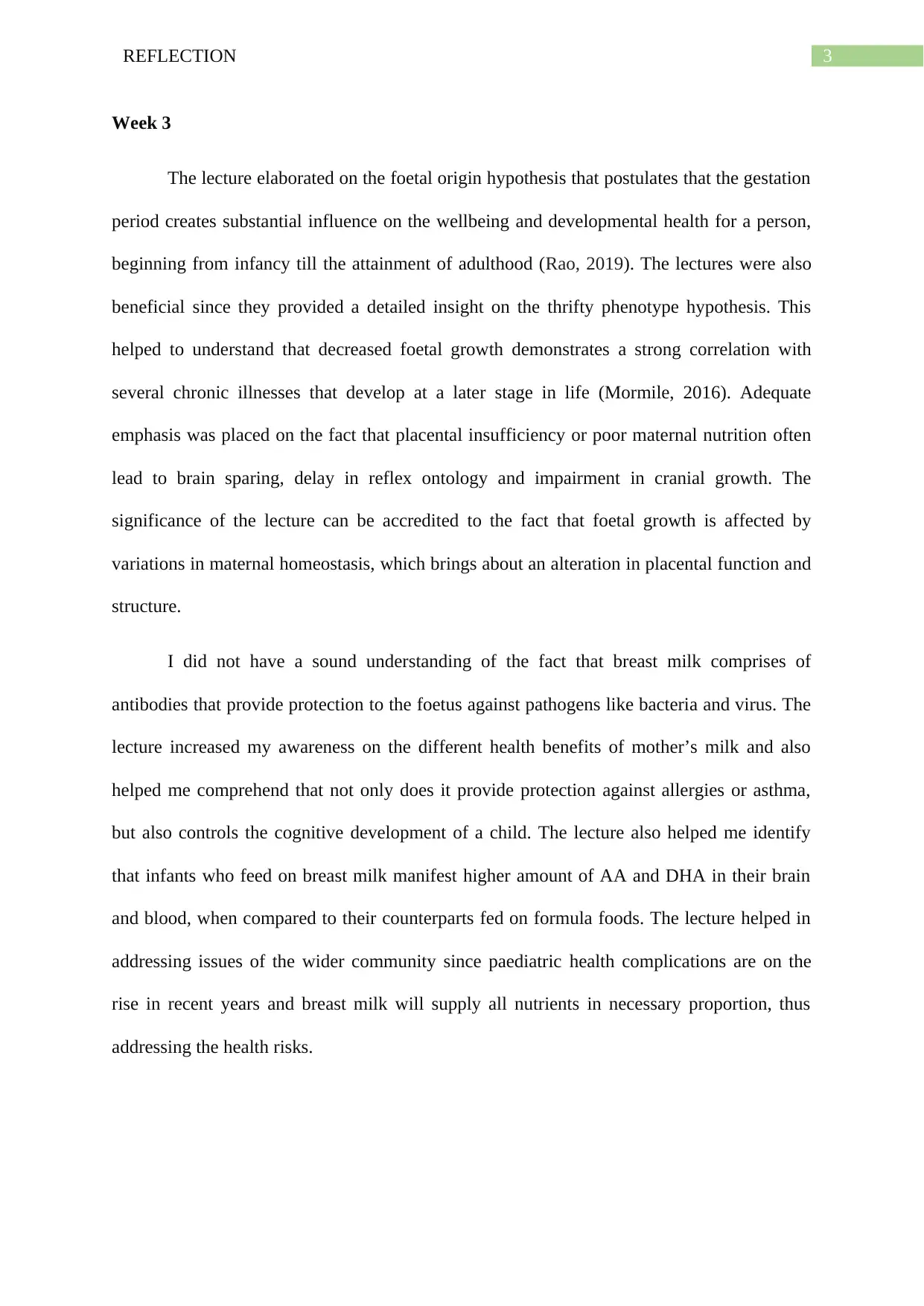
3REFLECTION
Week 3
The lecture elaborated on the foetal origin hypothesis that postulates that the gestation
period creates substantial influence on the wellbeing and developmental health for a person,
beginning from infancy till the attainment of adulthood (Rao, 2019). The lectures were also
beneficial since they provided a detailed insight on the thrifty phenotype hypothesis. This
helped to understand that decreased foetal growth demonstrates a strong correlation with
several chronic illnesses that develop at a later stage in life (Mormile, 2016). Adequate
emphasis was placed on the fact that placental insufficiency or poor maternal nutrition often
lead to brain sparing, delay in reflex ontology and impairment in cranial growth. The
significance of the lecture can be accredited to the fact that foetal growth is affected by
variations in maternal homeostasis, which brings about an alteration in placental function and
structure.
I did not have a sound understanding of the fact that breast milk comprises of
antibodies that provide protection to the foetus against pathogens like bacteria and virus. The
lecture increased my awareness on the different health benefits of mother’s milk and also
helped me comprehend that not only does it provide protection against allergies or asthma,
but also controls the cognitive development of a child. The lecture also helped me identify
that infants who feed on breast milk manifest higher amount of AA and DHA in their brain
and blood, when compared to their counterparts fed on formula foods. The lecture helped in
addressing issues of the wider community since paediatric health complications are on the
rise in recent years and breast milk will supply all nutrients in necessary proportion, thus
addressing the health risks.
Week 3
The lecture elaborated on the foetal origin hypothesis that postulates that the gestation
period creates substantial influence on the wellbeing and developmental health for a person,
beginning from infancy till the attainment of adulthood (Rao, 2019). The lectures were also
beneficial since they provided a detailed insight on the thrifty phenotype hypothesis. This
helped to understand that decreased foetal growth demonstrates a strong correlation with
several chronic illnesses that develop at a later stage in life (Mormile, 2016). Adequate
emphasis was placed on the fact that placental insufficiency or poor maternal nutrition often
lead to brain sparing, delay in reflex ontology and impairment in cranial growth. The
significance of the lecture can be accredited to the fact that foetal growth is affected by
variations in maternal homeostasis, which brings about an alteration in placental function and
structure.
I did not have a sound understanding of the fact that breast milk comprises of
antibodies that provide protection to the foetus against pathogens like bacteria and virus. The
lecture increased my awareness on the different health benefits of mother’s milk and also
helped me comprehend that not only does it provide protection against allergies or asthma,
but also controls the cognitive development of a child. The lecture also helped me identify
that infants who feed on breast milk manifest higher amount of AA and DHA in their brain
and blood, when compared to their counterparts fed on formula foods. The lecture helped in
addressing issues of the wider community since paediatric health complications are on the
rise in recent years and breast milk will supply all nutrients in necessary proportion, thus
addressing the health risks.
Paraphrase This Document
Need a fresh take? Get an instant paraphrase of this document with our AI Paraphraser
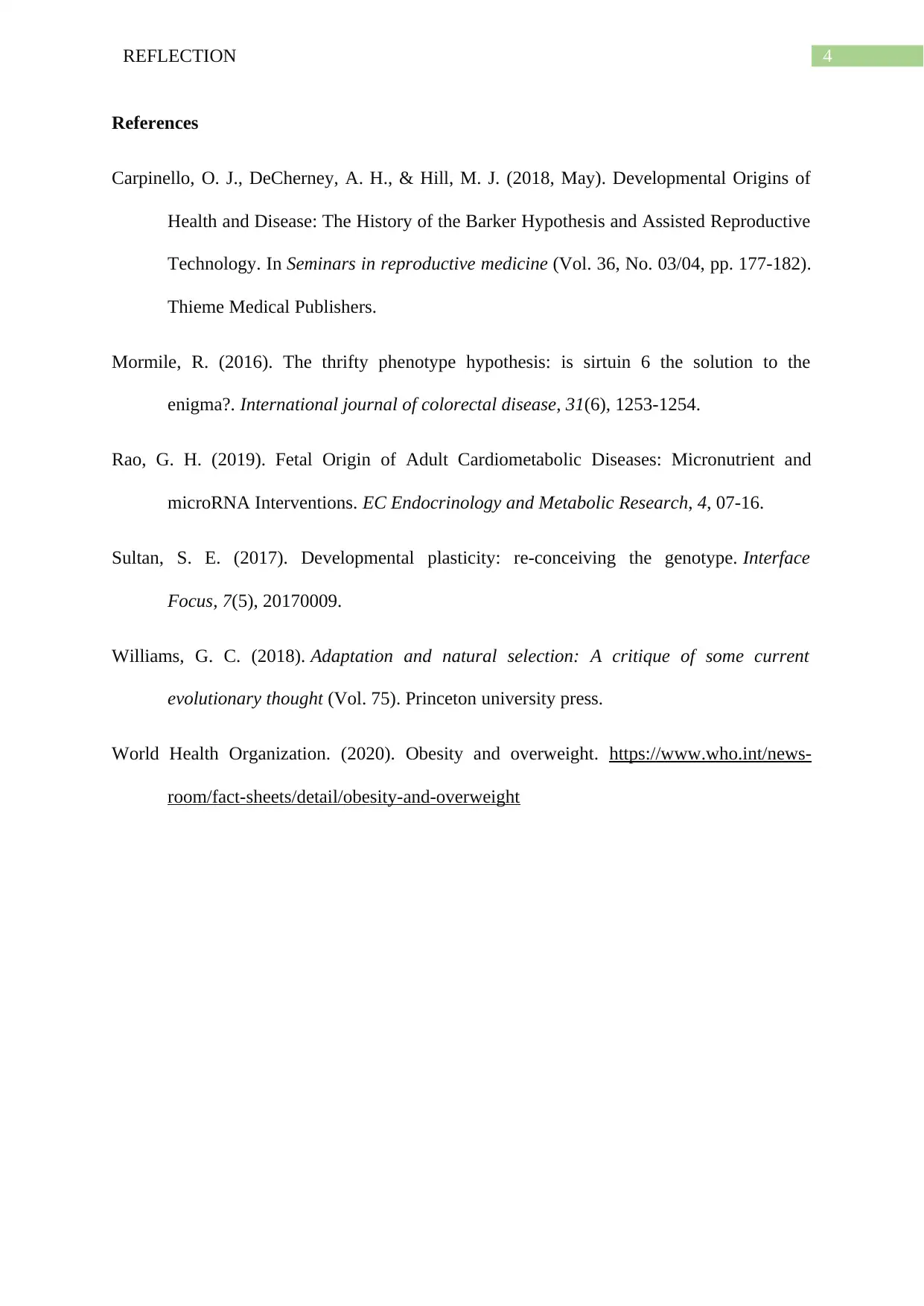
4REFLECTION
References
Carpinello, O. J., DeCherney, A. H., & Hill, M. J. (2018, May). Developmental Origins of
Health and Disease: The History of the Barker Hypothesis and Assisted Reproductive
Technology. In Seminars in reproductive medicine (Vol. 36, No. 03/04, pp. 177-182).
Thieme Medical Publishers.
Mormile, R. (2016). The thrifty phenotype hypothesis: is sirtuin 6 the solution to the
enigma?. International journal of colorectal disease, 31(6), 1253-1254.
Rao, G. H. (2019). Fetal Origin of Adult Cardiometabolic Diseases: Micronutrient and
microRNA Interventions. EC Endocrinology and Metabolic Research, 4, 07-16.
Sultan, S. E. (2017). Developmental plasticity: re-conceiving the genotype. Interface
Focus, 7(5), 20170009.
Williams, G. C. (2018). Adaptation and natural selection: A critique of some current
evolutionary thought (Vol. 75). Princeton university press.
World Health Organization. (2020). Obesity and overweight. https://www.who.int/news-
room/fact-sheets/detail/obesity-and-overweight
References
Carpinello, O. J., DeCherney, A. H., & Hill, M. J. (2018, May). Developmental Origins of
Health and Disease: The History of the Barker Hypothesis and Assisted Reproductive
Technology. In Seminars in reproductive medicine (Vol. 36, No. 03/04, pp. 177-182).
Thieme Medical Publishers.
Mormile, R. (2016). The thrifty phenotype hypothesis: is sirtuin 6 the solution to the
enigma?. International journal of colorectal disease, 31(6), 1253-1254.
Rao, G. H. (2019). Fetal Origin of Adult Cardiometabolic Diseases: Micronutrient and
microRNA Interventions. EC Endocrinology and Metabolic Research, 4, 07-16.
Sultan, S. E. (2017). Developmental plasticity: re-conceiving the genotype. Interface
Focus, 7(5), 20170009.
Williams, G. C. (2018). Adaptation and natural selection: A critique of some current
evolutionary thought (Vol. 75). Princeton university press.
World Health Organization. (2020). Obesity and overweight. https://www.who.int/news-
room/fact-sheets/detail/obesity-and-overweight
1 out of 5
Related Documents
Your All-in-One AI-Powered Toolkit for Academic Success.
+13062052269
info@desklib.com
Available 24*7 on WhatsApp / Email
![[object Object]](/_next/static/media/star-bottom.7253800d.svg)
Unlock your academic potential
Copyright © 2020–2026 A2Z Services. All Rights Reserved. Developed and managed by ZUCOL.


